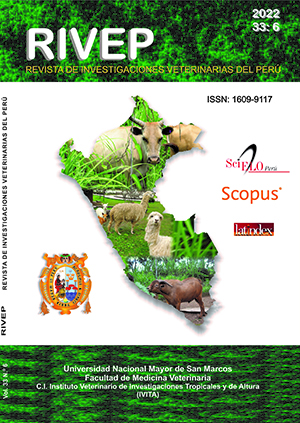Factors influencing Good Farming Practices implementation among sheep smallholders in the Colombian post-conflict scenario
DOI:
https://doi.org/10.15381/rivep.v33i6.22778Keywords:
Good Farming Practices, sheep smallholders, grazing, post conflictAbstract
The signing of the peace agreement between the Revolutionary Armed Forces of Colombia and the Colombian government brought a change in the social dynamics of rural regions of Colombia that has affected small sheep producers in post-conflict regions. The aim of this study was to identify the sociodemographic factors that affect the implementation of Good Agricultural Practices (GAP) in extensive sheep systems in the Colombian post-conflict and their relationship with some health, production and economic indicators. Thirteen sheep farms located in Marulanda, Colombia were evaluated. The implementation of the GAP was determined through a structured evaluation instrument based on Colombian legislation (Res. 20277 of 2018). In addition, a sample of sheep under 1 year of age was taken from each farm to conduct clinical examinations and laboratory analysis to obtain sanitary indicators. Age (β=-0.31, p=0.04), secondary education level (β=7.91, p=0.05) and income (β=5.29, p=0.04) determined the adoption of practices contained in the GAP and these were translated in productive, sanitary and economic benefits such as the increase in the price of the live animal (r=0.85, p<0.001), weight at slaughter (r=0.57, p<0.05), hematocrit (r=0.64, p<0.05), low prevalence of Eimeria spp (r=-0.71, p<0.001) and age at slaughter (-0.74, p<0.001). The implementation of GAP in ovine systems of the Colombian post-conflict represents productive advantages; however, the age, education and economic income of the producers influence such implementation.
Downloads
Downloads
Published
Issue
Section
License
Copyright (c) 2022 Rick Obrian Hernandez, Marlyn H. Romero, Jorge A. Sánchez

This work is licensed under a Creative Commons Attribution 4.0 International License.
AUTHORS RETAIN THEIR RIGHTS:
a. Authors retain their trade mark rights and patent, and also on any process or procedure described in the article.
b. Authors retain their right to share, copy, distribute, perform and publicly communicate their article (eg, to place their article in an institutional repository or publish it in a book), with an acknowledgment of its initial publication in the Revista de Investigaciones Veterinarias del Perú (RIVEP).
c. Authors retain theirs right to make a subsequent publication of their work, to use the article or any part thereof (eg a compilation of his papers, lecture notes, thesis, or a book), always indicating the source of publication (the originator of the work, journal, volume, number and date).










